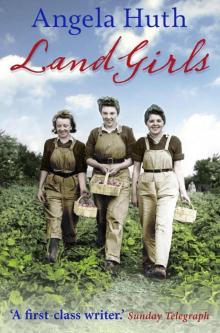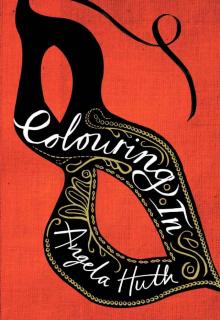- Home
- Angela Huth
Another Kind of Cinderella and Other Stories Page 8
Another Kind of Cinderella and Other Stories Read online
Page 8
Even as the party took place, Isabel was aware of that quality of luminescence that usually touches the memory of things past rather than present reality. She clutched each moment to herself, wanting to preserve it in all its detail. She was not, after all, a girl so used to parties that circumstances had to be particularly vivid to cause the kind of impression that cannot fade. The wonder was increased by the constant presence of Jacques by her side. They shared her rug for the picnic on the bank by the willow, now a familiar place. A half-moon rose in the jade-black sky, its face smeared by unhurried clouds. Someone had brought jars containing candles, which were lighted in random spots, and a man with no apparent girlfriend (Isabel’s heart went out to him in ‘sublime compassion’) sat playing a melancholy tune on his flute.
‘This is very mad, very English,’ Jacques said. He was folding dismal threads of ham into a piece of bread for Isabel. The food was not of the same standard as the previous picnic, but there was no shortage of pink champagne.
Once seated and eating, the chattering of the undergraduates lost its shrillness. It was as if, awed by the density of the warm night, intoxicated by the smells of ripe hay and damp long grass, they tempered their voices. Such innocence! Jacques replied, when Isabel whispered these thoughts to him. It was just that a good deal of drink and dope has already been consumed, he said. But it seemed to Isabel that the voices were quieter. It was always possible to hear the flute among them.
When the picnic was finished, more cigarettes and joints were lighted. One punt, bearing two couples, set off uncertainly into the darkness. Those left on the bank switched on a tape of rock music and began barefoot to dance. This enraged the others, who thought such crudeness broke the spell of the age they were trying to recreate, and sentimental tunes from the 30s were put on instead.
‘Still wrong,’ pointed out Jacques, ‘but I suppose we can’t dance to The Last Rose of Summer.’
He helped Isabel to her feet, but not to dance.
‘I’m not much good,’ he said. ‘No sense of rhythm. Let’s see what’s happening under our tree.’
They stepped from the moody darkness of the riverbank into the thicker gloom beneath its branches. On the ground were more jars of candles, the light not strong enough to turn the long leaves into ribbon shadows, as the fierce sun had managed on their last visit. Several couples were lying together, oblivious of each other, of everyone. Girls squirmed, long skirts thrown back over their knees. They lay on striped blazers, covered by thrusting flannel haunches: mouths locked.
‘I told you,’ said Jacques.
Isabel was glad of the darkness. She felt herself stiffen, blush. She was suddenly awkward. Jacques took her hand, led her back outside.
‘What would you like to do? Dance with someone else?’
‘Just watch,’ said Isabel.
They took a bottle, the rug and cushions, and made themselves comfortable in one of the moored punts. They watched the dancing and embracing under gently changing patterns of moon and cloud. The music, thin recordings of sad love songs, fluttered down to them. They did not speak.
Isabel, on purpose, had not brought her watch. So she had no idea what precise moment of the night Jacques stirred, and concentrated on rubbing his ankle, which he had bruised some days before.
‘I suppose I must admit the impossible has happened,’ he said. ‘Mon Dieu: I would never have thought it. I think I have fallen in love. Je te veux bien.’
He turned to Isabel, unsmiling. Straightened her hat, lifted the veil. The lace pushed back, she now had an unobstructed view of his face, silvery green, with enquiring eyes.
At about four-thirty a.m. people began to go home. Punts set off alone at intervals, filled with loose-limbed revellers in stained and damaged clothes. When the last punt was about to leave, Jacques suggested he and Isabel should not take it, but walk back a little later. She agreed. She wanted the night to last, not for ever – people who expressed such views were thereby impeding the order of progress – but for a while yet.
So they were left behind. They stood on the bank, waving, the objects of much good-humoured speculation, till the punt rounded the bend, leaving only a few long, sleepy laughs and cries in its wash.
They stood in silence till the voices were finally no more, and then heard bright new laughter behind them. It was distinct, infectious. In the gunmetal light of the dawn sky, Isabel could see Jacques looked annoyed.
‘So we’re not the only ones, after all. Others are still here.’
He pushed his way through the branches of the willow tree. In a moment he was back.
‘No one,’ he said. ‘I could have sworn I heard . . .’
‘So did I.’
‘Well, if there’s no one, that’s good. I wanted you alone.’ He patted her shoulder. ‘You’re cold.’
‘Not very.’
Jacques took off his blazer, put it round her.
‘I feel,’ he said, ‘I don’t know – restless. Stiff from all the sitting. Do you mind if I stretch my legs for a few yards? Back in ten minutes.’
‘Of course.’
Isabel watched him walk away from her. He quickly disappeared into the mist that rose from the ground, a milk-grey mist that matched the paling of the sky.
The place, now everyone had gone, was lonely, the silence oppressive. Isabel longed for birdsong, the dawn chorus, the lowing of cows – anything to cloud the quiet into which the laughter might break again. She felt unsafe without Jacques at her side. Afraid. She wished she had her watch, so that she could time his return.
There it was again: the laughter.
This time it was nearer, but muffled. It was definitely coming from under the willow tree: people hiding, joking, trying to frighten her, was Isabel’s immediate thought. Crossly, in her nervousness, she parted the branches and entered the hiding place. On the ground, the candles had burnt out in their jars. A blue suede sandal lay on its side, heel broken. But there was no one there.
Isabel heard herself utter a small cry, clap her hand to her mouth. She turned, ready to hurry outside, when a man appeared through the thickness of the branches.
‘Jacques!’ she screamed.
As she darted towards him, he backed away, indistinct in the poor light. But she clearly saw a flash of long white hand streaked with black mud, and a recognisable expression of something like evil. Then he was gone, vanished with no word. What terrible game was he playing? Isabel put a hand on the tree trunk to support herself. She was icy, shivering, confused. What had happened? What was this terrifying trick all about? Isabel looked round at the silent jangling shadows of the willow leaves, and knew she could not bear another moment in this horrible place. She must find Jacques, get him to explain . . .
She ran through the branches, hating their touch, and on to the tow-path. It was lighter now: that luminescent moment before real daylight. Isabel looked upriver. No sign of Jacques.
But, some twenty yards ahead, a girl. She was standing with her back to Isabel, looking in the same direction, upriver. Her presence brought relief. Obviously, she was a member of the party who had somehow missed a lift home.
Isabel called out to her. The girl did not move. In the silence between them, Isabel had the curious sensation that she was looking at herself, a mirror image, a reflection that she could not explain. The stranger on the path was the same height. She wore a long, bleached dress, though no detail was clear. Her hair was piled up in the same manner as Isabel’s, though she wore no hat. Isabel put her hand to her head and found that her own hat, too, had gone. At the same moment, the reflection touched her hair. Isabel, remembering she had left the hat in the punt, shivered violently.
But, in her usual disciplined way, she called upon every source of common sense to come to her rescue. She was not a great believer in the supernatural: she had never seen a ghost. She did, however, acknowledge that strands of time can be confused, most particularly when some event of great significance has occurred. The complications of such theo
ries were beyond her, and at this moment she gave them no thought. Curious, alarmed, she wondered what trick of the imagination, the light, her eyes, had caused this insubstantial vision of a girl who appeared to be a replica of herself. Perhaps, she thought, it was a mirage. Or even the unaccustomed quantity of pink champagne.
She called again.
This time the girl turned to her. For an infinitesimal moment she could see that she had no face – that is, no face delineated by its features. Instead, beneath the piled-up hair, was a simple disc, silvery transparent as the waning moon. In the second that Isabel was trying to readjust her focus, there was a loud crash, a hectic splash in the water. She swerved round to see that two swans had landed. They had set up their positions, cob following swan, in huge swirling necklaces of brown ripples. While the sudden noise had frightened her, the peaceful domesticity of the scene now reassured her. The swans were substantial, safe, not the stuff of illusion. She turned again to see what reaction they had caused in the girl. But she was no longer there.
Jacques was in her place, walking quickly towards Isabel. Happy, judging from his bouncing stride. Isabel ran to him. He waved. From a distance Isabel noticed his hand was streaked with mud. When she reached him, the hand was clean. There was no time for calculations.
Isabel flung herself into his arms. He held her.
‘What’s all this – hey? What’s happened to the happy face of the girl I love?’
The face was buried in the concave chest, feeling the warm dampness of his cotton shirt. Jacques, confused, continued his teasing tone.
‘I gave you ten minutes, precisely, to make up your mind. What were you thinking? Do you love me? Or is this heart to be unrequited?’ He pushed Isabel away from him. ‘Is it something serious? Tell me what’s happened. Tell me as we walk back.’
Isabel could not be sure – she could not be sure of anything in this unnerving dawn – but she thought she detected a note of malice in Jacques’ concern: the voice was hollow, somehow. Unsoft. Fighting such thoughts, fully aware of her confusion, she took his arm. Pressed together by the narrowness of the tow-path, they began the walk back to Oxford. Long grass each side of them was feathered with dew. Birds had begun to sing. In the security of near daylight, Isabel did her best to describe the hallucinations, knowing how ridiculous they sounded. Jacques made light of her experience – to comfort her, perhaps, she thought. He seemed untroubled, amused by her story: suggested someone could have spiked her drink. But he did agree that he, too, had heard unaccountable laughter.
By the time they arrived at Magdalen Bridge, the sun was up and busses passed to and fro.
‘You must not give another thought to all the weird happenings,’Jacques said. ‘I put them all down to an unaccustomed drink, and much too much hard work. I’d say you’re a little overwrought. You haven’t had enough fun at Oxford so far. I mean to change all that. Now you must go back and get some sleep. When you wake, what I ask you to think about is . . . me.’
They parted with a chaste kiss. Isabel, never more grateful for the normality of daylight, hurried back to her room. Her immediate concern was to get rid of the dress. She tore it off, ripping fragile seams, stuffed it into a plastic bag and took it to a dustbin behind the kitchens. Too awake to go to bed, she then sat at her desk, her mind ablaze with a plan. It was only when details of this plan were finalised that she pondered on Jacques’ declaration, tried to determine what it meant to her. But rational analysis was elusive, blotted out by image after image of a faceless girl and a terrifying man, both of them familiar.
That afternoon Isabel returned to the second-hand shop near the station. The owner well remembered the bundle of clothes from which Isabel had chosen the dress. They came from a friend, a Mrs Williams, whose husband was a retired lock keeper. She gave Isabel the address.
Two days later, work finished early, Isabel found the Williamses’ cottage. It was four miles west of Oxford, an unpretentious detached building on a small lane that ran between two cornfields. The only other habitation in sight was the lock keeper’s cottage, presumably where Mr Williams had lived before his retirement. Isabel was hot after the bicycle ride, sweating. She pushed stray wisps of hair under her straw hat, and walked up the cinder path between lavender, rosemary and white tulips.
A large man of about seventy answered the door: rolled-up sleeves, braces, a gardener’s hands. He smiled.
‘I wonder if you can help me,’ Isabel began. She realised she had made no plans for an opening explanation. ‘I recently bought a dress from a bundle of clothes you were selling in Oxford. I was interested to know if you could tell me something of its history.’
Mr Williams did not seem averse to the idea of the company of a stranger. He invited her in. ‘The wife’s just put the kettle on,’ he said.
Isabel followed him into a small front room of large polished furniture. Everything was brown – wallpaper, bristling sofa, thick curtains, dull velvet cloth on the table, and the different tones of brown, all burnished by the sunlight, conveyed a low-watt life. How gloomy such a room would be in November, Isabel thought. It was stifling, airless. Windows all shut. She sat on a brown wooden chair at the table, where the only relief was a bowl of orange silk poppies. The wall in front of her was covered in sepia photographs of ancestors in brass frames.
‘So what can I do for you?’
Mr Williams’ braces were brown, his eyes were brown. Isabel repeated her interest in the dress. Mr Williams gave no indication he thought this an untoward request.
‘Can’t say I remember it, precisely, the one you describe. There was a whole big bundle – maybe the wife will know the one you mean. All I can tell you is they belonged to my grandmother, Ellen. She was a good woman but she was vain. Always buying herself pretty dresses. We got stacks of them up in the attic, selling them fast. It’s quite fashionable, they say, all that sort of old stuff today. We get a good price.’
Mrs Williams came in with a tray of beige cups, tea and brown biscuits. Her husband let out a long sigh. Isabel’s heart was beating uncomfortably fast. She felt faint from the lack of air.
‘Can you remember a cream dress, Jean, in the last lot that went to Oxford?’
‘With forget-me-nots,’ added Isabel. ‘Muslin. A frill at the hem.’
Mrs Williams poured tea. In the airlessness of the room, it seemed to Isabel, there was a certain reluctance in her action. Her mouth was grim.
‘Can’t say I can,’ she said at last. ‘She had so many dresses, much of a muchness.’
She passed a cup of tea to Isabel, then took one of the framed photographs from the wall. ‘This is her,’ she said. ‘Ellen. And Jack.’
Isabel studied the photograph. It was so faded the figures were barely discernible, splattered by milky white splotches. But she could make out the small, thin shape of a woman in a long, tight-waisted dress: impossible to tell if it was the dress. Her face was featureless, bleached out, a void beneath her piled-up hair. Beside her stood a tall, thin man, one side of his face too faded to see – in the other, a single eye was fierce, the corner of the mouth turned down. He wore a cricketing blazer, the stripes reduced to almost invisible sepia and cream.
‘Can’t see much, can you?’ said Mrs Williams, a shade of triumph in her voice.
‘Funny thing,’ said her husband, turning to Isabel and snapping his braces one after the other, ‘but you quite put me in mind of Ellen, the pictures I’ve seen of her. She was pretty all right. Trim.’
‘Don’t tell me you can tell what folk look like from old snaps, John,’ said Mrs Williams. She left the room, taking her cup of tea. Her sharpness made no discernible effect on Mr Williams.
‘To tell the truth,’ he said at last, ‘they were an odd couple, my grandparents. Can’t help you much about the particular dress, young lady, but I can tell you they were a very odd couple. Tragic, really.’
Isabel listened to the muffled tick of the brown wooden clock.
‘Why?’ she asked, still ligh
t-headed from the lack of oxygen in the room.
‘I shouldn’t say this, but she came to a nasty end.’ He glanced towards the door, checked there was no sound from his wife. ‘The family doesn’t like it talked about, but I’ll tell you, seeing as how you bought one of Ellen’s dresses. It was like this, so my father told me. Young Ellen was a pretty girl, lots of young men keen to court her, but she liked to keep herself to herself. Along came this Jack fellow, a farm labourer. He was tall, thin, but not half strong: could earn more than any of them in overtime during harvest week. Something a bit queer about him, though: wanted to get into the academic world, be a porter at a college, know what I mean? Ideas above his station. But he was the one who changed her mind about going out with a fellow regular, if you understand me.
‘They used to do their courting, Jack and Ellen, down the riverbank, a mile or so from here. He was a strong punter, Jack. Used to take Ellen off in her party dresses, tie up by that big willow – you might know the one I mean – for apicnic and whatever – nothing wrong, I don’t suppose, being those days. We’ve a photo of them somewhere, down there, taken by Jack’s sister, my Great Aunt Agnes. Those were the hey-days, I suppose. Then it all went wrong once they were married. There are stories, but no one has the details.’
Mr Williams, even in his wife’s absence, lowered his voice.
‘Well, Ellen, she refuses Jack first time he proposes. She’s quite adamant. She loves him but she doesn’t want to be tied down in marriage. So Jack, he bides his time: asks her again. Again, no, says Ellen: she was an independent woman, my grandmother. “Well, I’m not going to give up,” says Jack, and the third time he asks her she comes round. Says yes. So they marry and have the one son, my father. Jack stays on the land, no more talk of college work. He slacks off a bit, so the word goes, drinks a bit. Money gets tight. Ellen says she’ll go out to work, get a job as a serving maid in one of the colleges. She does, too. Christ Church. That may have been the start of it, the trouble. We can’t be sure, but there was a rumour. My father says he remembers as a boy overhearing a row between his parents; something about a steward who’d taken a fancy to Ellen. Maybe she fancied him back. Anyhow, things definitely weren’t good at home. Jack was drinking heavily.

 Sun Child
Sun Child South of the Lights
South of the Lights Virginia Fly is Drowning
Virginia Fly is Drowning Of Love and Slaughter
Of Love and Slaughter Such Visitors
Such Visitors Once a Land Girl
Once a Land Girl Land Girls
Land Girls Colouring In
Colouring In Nowhere Girl
Nowhere Girl Monday Lunch in Fairyland and Other Stories
Monday Lunch in Fairyland and Other Stories Another Kind of Cinderella and Other Stories
Another Kind of Cinderella and Other Stories Invitation to the Married Life
Invitation to the Married Life Easy Silence
Easy Silence